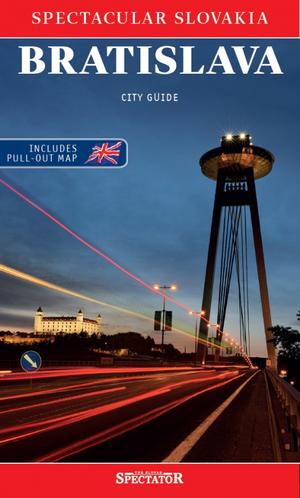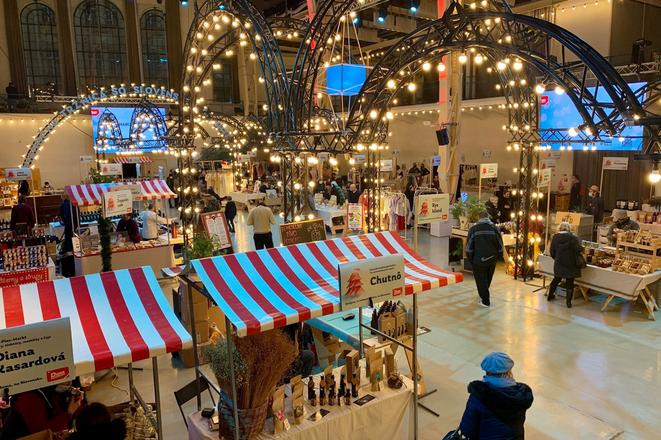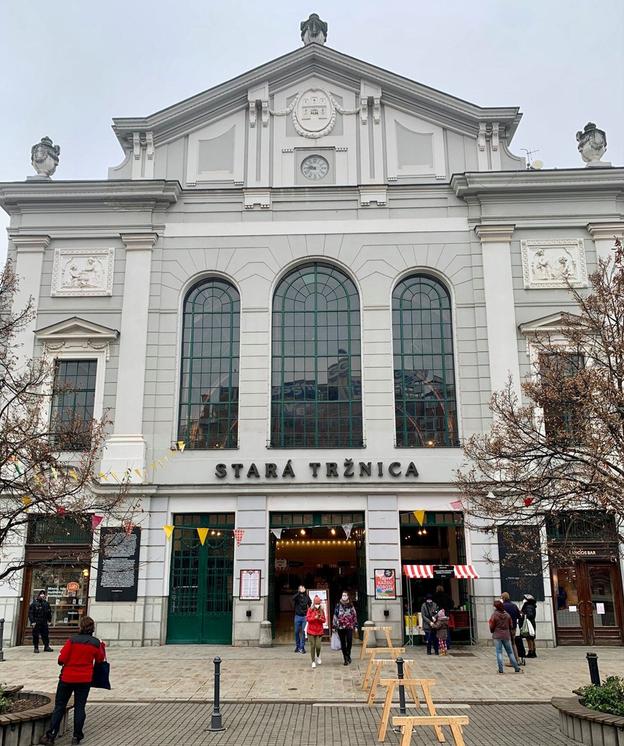 Lost in Bratislava? Impossible with this City Guide! (source: Spectacular Slovakia)
Lost in Bratislava? Impossible with this City Guide! (source: Spectacular Slovakia)
In the years before the pandemic, I visited friends in Bratislava who would often take me to Stará tržnica, the Old Market Hall, with its aura of gentle care such that no one minds the crush of people who gather there on Saturday mornings. We are all looking for the right cheese, the right wine, the cakes and juices, the sausages, the handmade chocolate delicacies, and we all are buoyed by the pleasant entrepreneurs in tidy aprons who cater to our gustatory whims and care about our weekend pangs of hunger. Often the cheese vendors are attractive young women who smile mildly without any intent other than our satisfaction. At another table, young men offer samples of a wine that seems to be already telling tales in our heads.
How I relish the hubbub of citizenry, of neighbours and friends, of all ages, from creeping babies to sitting old men already gripping a glass of amber and staring into memories, seemingly unaware of the buzz around them. And the plain tables and the plainer benches where those finished their shopping gossip over pastry and coffee. Sometimes it’s possible to lose sight of those friends who brought me here, bumping shoulder to shoulder with Slovaks, but I haven’t even the slightest worry because I know how to say dobrý deň and ďakujem, and because, as I circulate, everyone comes round in orbit again.
I walk up the stairs to the upper level that rims the vaulting open market. I look below and see the stands and the booths and the crowd. But not for long because up here the attractions unrelated to food are waiting: detritus from another time, glass and metal bric-a-brac once common but now handled with nostalgic fondness, vintage and workday clothes, books from countries near and far, plus the pleasure of speaking English to one thin man behind his display table about what life in Bratislava might have been like in that postcard circa 1950, only one euro for me.
Back down below I pass the corner set up for children, the places they can draw and colour and every now and then watch a clown or magician disguised as a university student perform tricks with shiny, silver things. Some of the little boys have an urchin look, begging with open mouths for more wizardry, standing stock still at the edge of the show in washed-out overalls they’ve outgrown, the extra patch on their knees already shredding.
Then, suddenly, here’s a white-haired, round grandmother. Her adult son, my friend, did not expect to see Babka here. She emerges out of the crowd as out of a fairy tale that features a wooden spoon central to its business; now both are talking and smiling, and so we all sit down and catch up on the week’s news.
If we leave by the second entrance, we pass by the sauerkraut lady, her great girth not a hindrance to scooping out the deliciously sour food from a larger tub into plastic carry-away bags bulging with ferment and flavour. Always the lineup here is long; and then the sunlight outside is a surprise, though not for a minute did it seem dark in the huge hall.
But if we decide to linger longer, then we might step into Dobre&Dobré, the cafe near the entrance. We pass through some heavy curtains, squeeze all of us around a small table and relax to the piano music played by a sprightly old woman likely younger than I am. Here’s the place for excellent cake and coffee, and to reflect on the wondrous good fortune that has brought me here to this Old World charm with these people I love. For a moment I remember that my friends once were strangers, and the strangeness of such a thought opens my heart even wider. Once foreigners, now friends. It feels right that I am the foreigner here.
But reflection isn’t for long, because soon we gather up our purchases, the bread and cakes, and already we are thinking about lunch, perhaps at home, perhaps in one of the restaurants that offer good quantities of beer and meat and, if necessary, tiny salads dominated by cucumber slices and vinegar to those who can't decide or decipher the menu. Of course, the soup no matter where we dine will always be tasty, a memory to savour, and ever after I am tempted to compare soups I meet in the future, in other places more familiar and more lauded, but those are unlikely to meet the mark of these superior Slovak bowls.
David Zieroth has published several books of poetry and memoir, most recently the bridge from day to night (Harbour Publishing, 2018).
Author: David Zieroth

 Bratislava’s Old Market Hall at Christmastime. (source: Facebook/Stará tržnica)
Bratislava’s Old Market Hall at Christmastime. (source: Facebook/Stará tržnica)
 Stará tržnica (source: Stará tržnica/Facebook)
Stará tržnica (source: Stará tržnica/Facebook)